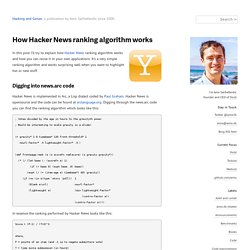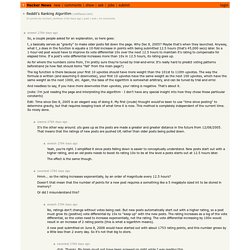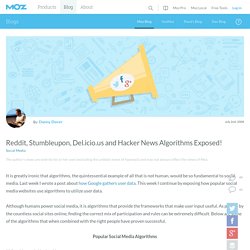

How Hacker News ranking algorithm works. In this post I'll try to explain how Hacker News ranking algorithm works and how you can reuse it in your own applications.

It's a very simple ranking algorithm and works surprising well when you want to highlight hot or new stuff. Digging into news.arc code Hacker News is implemented in Arc, a Lisp dialect coded by Paul Graham. Hacker News is opensource and the code can be found at arclanguage.org. Digging through the news.arc code you can find the ranking algorithm which looks like this: ; Votes divided by the age in hours to the gravityth power. ; Would be interesting to scale gravity in a slider. (= gravity* 1.8 timebase* 120 front-threshold* 1 nourl-factor* .4 lightweight-factor* .3 ) (def frontpage-rank (s (o scorefn realscore) (o gravity gravity*)) (* (/ (let base (- (scorefn s) 1) (if (> base 0) (expt base .8) base)) (expt (/ (+ (item-age s) timebase*) 60) gravity)) (if (no (in s!
Reddit's Ranking Algorithm. So, a couple people asked for an explanation, so here goes: t_s basically serves as "gravity" to make older posts fall down the page.

Why Dec 8, 2005? Maybe that's when they launched. Anyway, what t_s does in the function is equate a 10-fold increase in points with being submitted 12.5 hours (that's 45,000 secs) later. So a 1-hour-old post would have to improve its vote differential 10x over the next 12.5 hours to maintain it's rating to compensate for elapsed time. As for where the numbers come from, I'm pretty sure they're tuned by trial-and-error. The log function is there because your first 10 upvotes should have more weight than the 101st to 110th upvotes. And needless to say, if you have more downvotes than upvotes, your rating is negative.
(note: I'm just reading the page and interpreting the algorithm - I don't have any special insight into how they chose these particular constants) Edit: Time since Dec 8, 2005 is an elegant way of doing it. You should add one other point: don't do this if you're not already an establish... Reddit, Stumbleupon, Del.icio.us and Hacker News Algorithms Exposed! It is greatly ironic that algorithms, the quintessential example of all that is not human, would be so fundamental to social media.

Last week I wrote a post about how Google gathers user data. This week I continue by exposing how popular social media websites use algorithms to utilize user data. Although humans power social media, it is algorithms that provide the frameworks that make user input useful. As proven by the countless social sites online, finding the correct mix of participation and rules can be extremely difficult. Below are some of the algorithms that when combined with the right people have proven successful. How to get your startup on Hacker News - swombat.com. What difference does being a top story on Hacker News make? Stats and Facts... - Fresh Thoughts. Digg This!: 7 Cheats for Hitting The Front Page of Digg. Are you tired of your awe-inspiring article, mind-shattering blog entry or rambling anti-government manifesto not getting the web traffic you know it deserves?

Did you add a "Digg It" button to that brilliant epic poem you wrote about your recently-deceased cat, Twinkie, but nobody seems to be clicking it? Are you starting to suspect that MS Paint drawing of Draculanana might not be funny enough to make it to the front page of Digg after all? Think again. Digg, Reddit and all the other so-called "social media" sites can be a great way to get your message out to millions of people, but with so many voices out there screaming for attention it's hard to be heard sometimes--even if that 400,000-word poem about your dead cat is totally mind-blowingly awesome. But don't worry--in my time writing for Cracked.com I've picked up a few useful tricks that might help you on your quest for Digg greatness.
Digg & your social marketing strategy. Basic Tutorial for Social Marketing with Digg « SEO Tips, Hints. If you’ve at least dabbled in social media you have no doubt heard of Digg.

This site is the most popular of the social voting category of sites, boasting an Alexa Rank of 168, and is a darling of the Web 2.0 movement. The site, founded by entrepreneur Kevin Rose in 2004, has nearly tripled its number of registered users in the last year and currently boasts close to three million users. Although these numbers pale in comparison to megaliths such as Myspace, Digg offers marketers a large amount of traffic in specialized demographics, in addition to the benefits than be derived from having a high PR link.